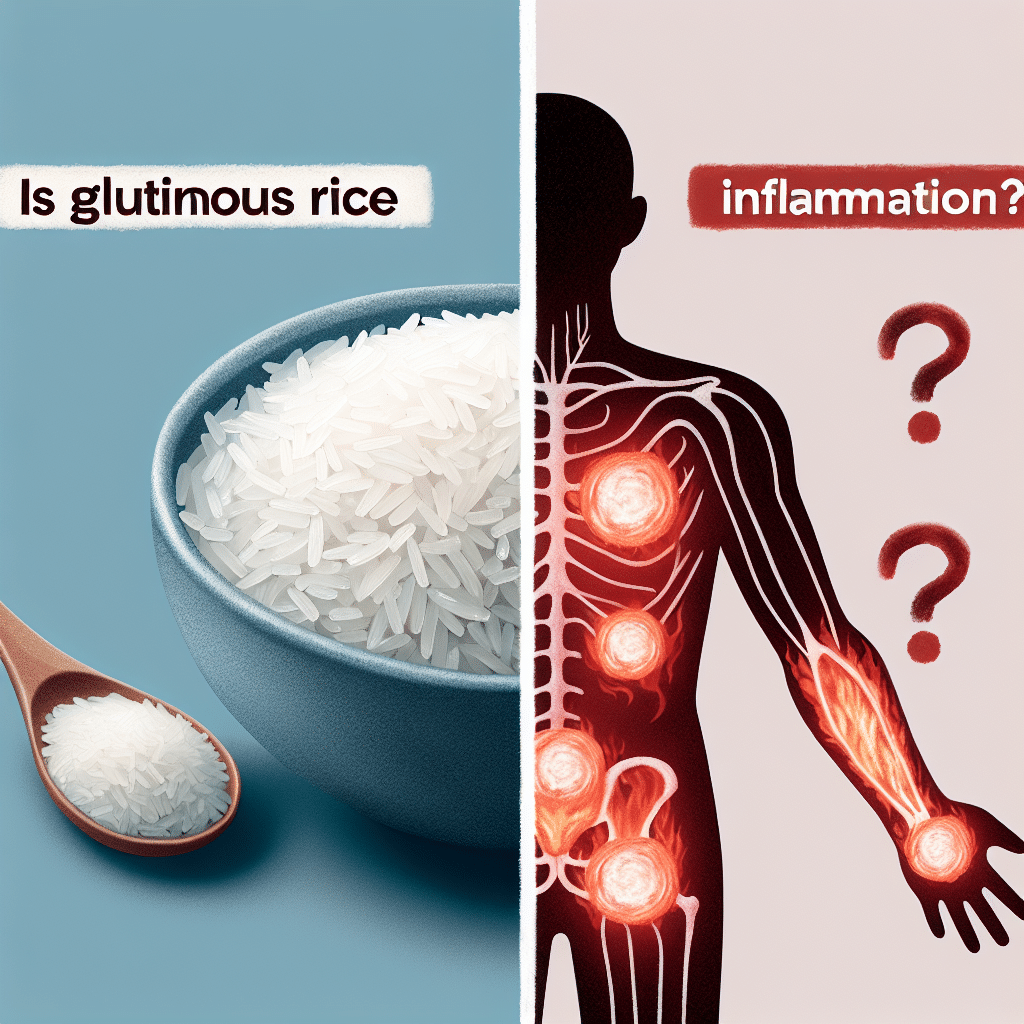Is Glutinous Rice Inflammatory?
-
Table of Contents
- Glutinous Rice and Inflammation: Understanding the Impact on Health
- What is Glutinous Rice?
- The Link Between Diet and Inflammation
- Is Glutinous Rice Inflammatory?
- Glycemic Index and Inflammation
- Whole Grains vs. Refined Grains
- Research Findings
- Factors to Consider
- Alternatives to Glutinous Rice
- Conclusion: Balancing Glutinous Rice in Your Diet
- ETprotein: A Healthy Protein Alternative
Glutinous Rice and Inflammation: Understanding the Impact on Health

Glutinous rice, also known as sticky rice or sweet rice, is a staple in many Asian cuisines, known for its unique texture and ability to hold together, making it an essential ingredient in dishes like sushi and mochi. However, with the increasing focus on health and nutrition, many people are questioning the impact of glutinous rice on inflammation and overall health. This article delves into the scientific research to explore whether glutinous rice is inflammatory and what that means for your diet.
What is Glutinous Rice?
Before we examine the inflammatory properties of glutinous rice, it’s important to understand what it is. Glutinous rice is a type of short-grained rice that becomes sticky when cooked due to its high amylopectin content, a type of starch. Despite its name, glutinous rice is gluten-free and should not be confused with gluten-containing grains.
The Link Between Diet and Inflammation
Diet plays a crucial role in modulating inflammation in the body. Chronic inflammation is associated with various health issues, including heart disease, diabetes, and autoimmune disorders. Foods high in refined sugars, trans fats, and certain oils are known to promote inflammation, while foods rich in antioxidants and omega-3 fatty acids can help reduce it.
Is Glutinous Rice Inflammatory?
To determine if glutinous rice is inflammatory, we need to look at its nutritional profile and how it affects the body’s inflammatory processes.
Glycemic Index and Inflammation
Glutinous rice has a high glycemic index (GI), which means it can cause a rapid spike in blood sugar levels. High-GI foods have been linked to increased inflammation, as they can lead to oxidative stress and an overproduction of inflammatory cytokines. Therefore, consuming large amounts of high-GI foods like glutinous rice may contribute to inflammation, especially in individuals with insulin resistance or diabetes.
Whole Grains vs. Refined Grains
Whole grains are generally considered anti-inflammatory due to their fiber content and nutrient density. However, glutinous rice is often consumed in its white, refined form, which lacks the bran and germ that contain beneficial nutrients. The refining process strips away these components, potentially reducing the anti-inflammatory benefits and leaving behind a product that may contribute to inflammation when consumed in excess.
Research Findings
Studies on glutinous rice and inflammation are limited, but research on white rice consumption, in general, suggests that it may not be the best choice for those looking to reduce inflammation. A study published in the American Journal of Clinical Nutrition found that a diet high in refined grains like white rice was associated with higher levels of inflammatory markers.
Factors to Consider
While the glycemic index and refinement process suggest that glutinous rice might be inflammatory, there are other factors to consider:
- Portion Size: Consuming glutinous rice in moderation may mitigate its potential inflammatory effects.
- Preparation Method: Cooking methods that reduce the GI, such as parboiling, can make glutinous rice a more suitable option.
- Dietary Balance: Pairing glutinous rice with foods high in fiber, protein, and healthy fats can help stabilize blood sugar levels and reduce inflammation.
Alternatives to Glutinous Rice
For those concerned about inflammation, there are several alternatives to glutinous rice that offer lower GI values and more nutrients:
- Brown rice
- Quinoa
- Barley
- Wild rice
These grains can be used in similar ways to glutinous rice and may provide more health benefits due to their fiber content and nutrient profiles.
Conclusion: Balancing Glutinous Rice in Your Diet
In conclusion, while glutinous rice may have the potential to be inflammatory due to its high glycemic index and refined nature, it can still be part of a balanced diet when consumed in moderation and paired with other nutrient-dense foods. It’s important to consider individual health conditions and dietary needs when determining the role of glutinous rice in your diet.
ETprotein: A Healthy Protein Alternative
If you’re looking for ways to enhance your diet and reduce inflammation, consider incorporating protein products from ETprotein. Their range of organic, non-GMO, allergen-free vegan proteins can provide a nutritious boost to your meals. Whether you’re interested in rice protein, pea protein, or other plant-based options, ETprotein offers high-quality products that cater to various dietary preferences and needs.
Adding these proteins to your diet can help balance blood sugar levels, support muscle health, and contribute to overall well-being. For those looking to minimize inflammation and prioritize health, ETprotein’s products are an excellent choice.
About ETprotein:
ETprotein, a reputable protein and L-(+)-Ergothioneine (EGT) Chinese factory manufacturer and supplier, is renowned for producing, stocking, exporting, and delivering the highest quality organic bulk vegan proteins and L-(+)-Ergothioneine. They include Organic rice protein, clear rice protein, pea protein, clear pea protein, watermelon seed protein, pumpkin seed protein, sunflower seed protein, mung bean protein, peanut protein, and L-(+)-Ergothioneine EGT Pharmaceutical grade, L-(+)-Ergothioneine EGT food grade, L-(+)-Ergothioneine EGT cosmetic grade, L-(+)-Ergothioneine EGT reference grade and L-(+)-Ergothioneine EGT standard. Their offerings, characterized by a neutral taste, non-GMO, allergen-free attributes, with L-(+)-Ergothioneine purity over 98%, 99%, cater to a diverse range of industries. They serve nutraceutical, pharmaceutical, cosmeceutical, veterinary, as well as food and beverage finished product distributors, traders, and manufacturers across Europe, USA, Canada, Australia, Thailand, Japan, Korea, Brazil, and Chile, among others.
ETprotein specialization includes exporting and delivering tailor-made protein powder and finished nutritional supplements. Their extensive product range covers sectors like Food and Beverage, Sports Nutrition, Weight Management, Dietary Supplements, Health and Wellness Products, and Infant Formula, ensuring comprehensive solutions to meet all your protein needs.
As a trusted company by leading global food and beverage brands and Fortune 500 companies, ETprotein reinforces China’s reputation in the global arena. For more information or to sample their products, please contact them and email sales(at)ETprotein.com today.












